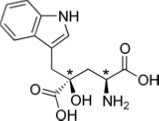Cargill builds science for new high-intensity Monatin sweetener

The compound R,R-monatin has a potency over 3,000 at 5% sucrose equivalent, report the scientists, led by Nese Yurttas, sensory manager at Cargill.
The paper, published in the Journal of Food Science adds to an existing patent application by Cargill detailing the potential of monatin for food, beverages, and as a table top sweetener.
“[Our data] implies that sweetness equivalent to 10% w/v sucrose, and even higher, should be readily achievable using monatin as the sole sweetener,” wrote Yurttas and her co-workers.
“In other words, beverages (the key application for high-potency sweeteners) could be formulated with monatin to have low or zero energy content yet have sweetness intensities identical to those customary in full-calorie, full-sugar versions.”
Cargill’s potential new sweetener
Unlike some other intense sweeteners, monatin has no bitter metallic, acidic or astringent aftertaste, claims Cargill in its patent application. It is also more stable than aspartame, has a cleaner taste than saccharin, is sweeter than sucralose and does not have the ‘liquorice’ aftertaste sometimes associated with stevia-based sweeteners, adds the firm.
“Monatin is a naturally-occurring, high intensity sweetener isolated from the plant Sclerochiton ilicifolius, found in the Transvaal Region of South Africa. Monatin contains no carbohydrate or sugar, and nearly no calories, unlike sucrose or other nutritive sweeteners at equal sweetness,” states the patent application.
It adds: “Different stereoisomers of monatin, including the R,R and S,S stereoisomers, have potential in the sweetener industry, either as separate ingredients or in blends. Monatin, and blends of stereoisomers of monatin with other sweeteners, are thought to have superior taste characteristics and/or physical qualities, as compared to other high intensity sweeteners.
“Because of its intense sweetness, the R,R stereoisomer in particular should be economically competitive compared to other high intensity sweeteners.”
New data
Turttas and her co-workers recruited 69 tasters to determine the sweetness concentration-response of R,R-monatin.
“The results show that R,R-monatin (sodium hydrogen salt) has a potency of about 3100 at 5% sucrose equivalent (SE) and 2700 at 8% SE making it one of the most potent naturally occurring sweeteners known,” they wrote.
They added: “This information will help developers of zero-, low- and reduced-calorie products formulate with monatin.”
Source: Journal of Food Science
Published online ahead of print, doi: 10.1111/j.1750-3841.2012.02885.x
“The Sweetness Concentration-Response of R,R-Monatin, a Naturally Occurring High-Potency Sweetener”
Authors: J.C. Fry, N. Yurttas, K.L. Biermann, M.G. Lindley, M.J. Goulson













